标签:custom springmvc 异常类 common 保存 time private hide 校验
1、定义响应模型
@Data public class CmsPageResult extends ResponseResult { CmsPage cmsPage; public CmsPageResult(ResultCode resultCode,CmsPage cmsPage) { super(resultCode); this.cmsPage = cmsPage; } }
2、定义添加Api
@ApiOperation("添加页面")
public CmsPageResult add(CmsPage cmsPage);
在cms_page集中上创建页面名称、站点Id、页面webpath为唯一索引
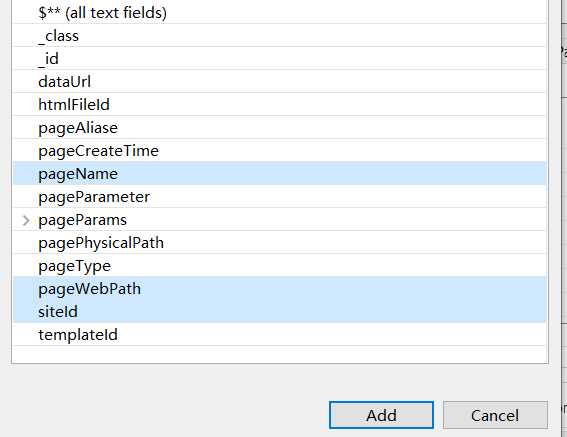
1、添加根据页面名称、站点Id、页面webpath查询页面方法,此方法用于校验页面是否存在
public interface CmsPageRepository extends MongoRepository<CmsPage,String> { //根据页面名称、站点id、页面访问路径查询 CmsPage findByPageNameAndSiteIdAndPageWebPath(String pageName,String siteId,String pageWebPath); 。。。
2、使用 CmsPageRepository提供的save方法 。
//添加页面 public CmsPageResult add(CmsPage cmsPage){ //校验页面是否存在,根据页面名称、站点Id、页面webpath查询 CmsPage cmsPage1 = cmsPageRepository.findByPageNameAndSiteIdAndPageWebPath(cmsPage.getPageName(), cmsPage.getSiteId(), cmsPage.getPageWebPath()); if(cmsPage1==null){ cmsPage.setPageId(null);//添加页面主键由spring data 自动生成 cmsPageRepository.save(cmsPage); //返回结果 CmsPageResult cmsPageResult = new CmsPageResult(CommonCode.SUCCESS,cmsPage); return cmsPageResult; } return new CmsPageResult(CommonCode.FAIL,null); }
//添加页面 @Override @PostMapping("/add") public CmsPageResult add(@RequestBody CmsPage cmsPage) { return pageService.add(cmsPage); }
请求内容为 json数据,测试数据如下:
{ "dataUrl": "string", "htmlFileId": "string", "pageAliase": "string", "pageCreateTime": "2018‐06‐11T02:01:25.667Z", "pageHtml": "string", "pageName": "测试页面", "pageParameter": "string", "pagePhysicalPath": "string", "pageStatus": "string", "pageTemplate": "string", "pageType": "string", "pageWebPath": "string", "siteId": "string", "templateId": "string" }
成功响应结果:
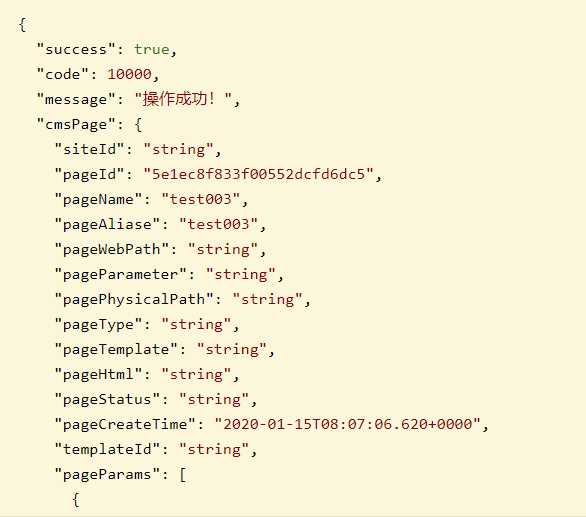
使用Element-UI的form组件编写添加表单内容,页面效果如下:
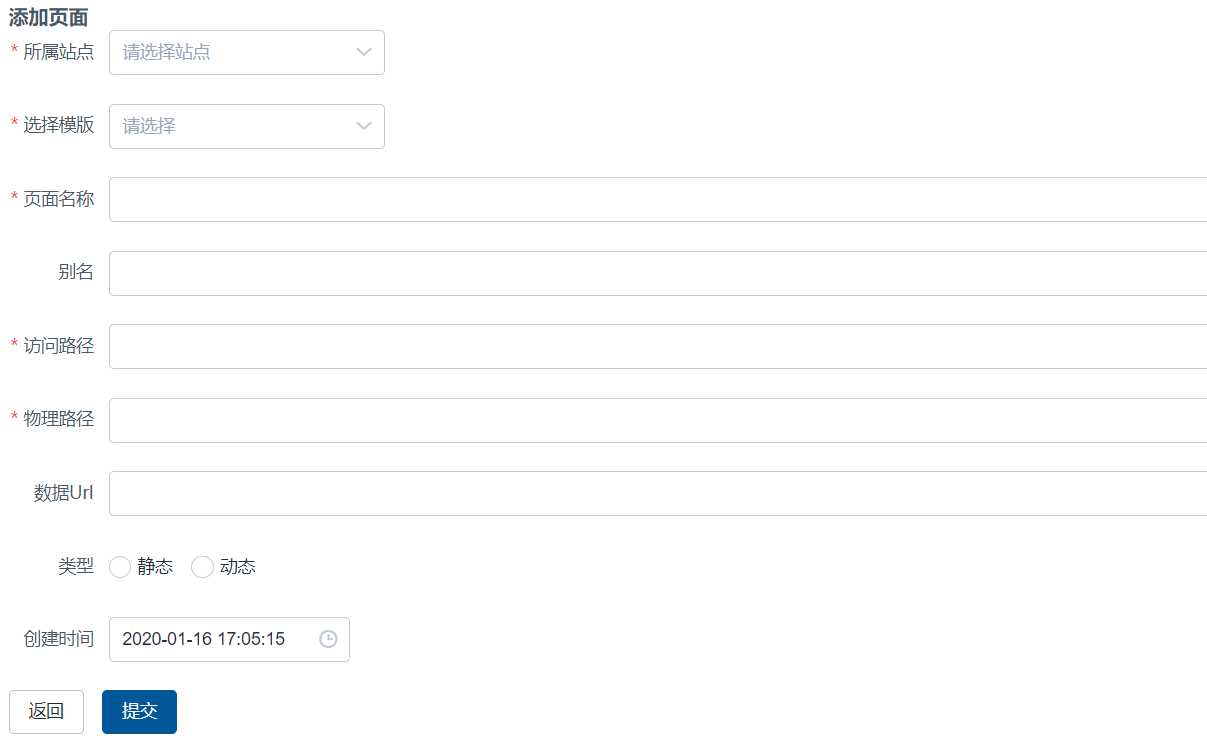
修改页面用户操作流程:
1、用户进入修改页面,在页面上显示了修改页面的信息
2、用户修改页面的内容,点击“提交”,提示“修改成功”或“修改失败”
修改页面需要定义的API如下:
@ApiOperation("通过ID查询页面")
public CmsPage findById(String id);
@ApiOperation("修改页面")
public CmsPageResult edit(String id,CmsPage cmsPage);
使用 Spring Data提供的findById方法完成根据主键查询 。
使用 Spring Data提供的save方法完成数据保存 。
//根据id查询页面 public CmsPage getById(String id){ Optional<CmsPage> optional = cmsPageRepository.findById(id); if(optional.isPresent()){ return optional.get(); } //返回空 return null; } //更新页面信息 public CmsPageResult update(String id,CmsPage cmsPage) { //根据id查询页面信息 CmsPage one = this.getById(id); if (one != null) { //更新模板id one.setTemplateId(cmsPage.getTemplateId()); //更新所属站点 one.setSiteId(cmsPage.getSiteId()); //更新页面别名 one.setPageAliase(cmsPage.getPageAliase()); //更新页面名称 one.setPageName(cmsPage.getPageName()); //更新访问路径 one.setPageWebPath(cmsPage.getPageWebPath()); //更新物理路径 one.setPagePhysicalPath(cmsPage.getPagePhysicalPath()); //执行更新 CmsPage save = cmsPageRepository.save(one); if (save != null) { //返回成功 CmsPageResult cmsPageResult = new CmsPageResult(CommonCode.SUCCESS, save); return cmsPageResult; } } //返回失败 return new CmsPageResult(CommonCode.FAIL,null); }
1、根据id查询页面
@Override @GetMapping("/get/{id}") public CmsPage findById(@PathVariable("id") String id) { return pageService.getById(id); }
2、保存页面信息
@Override @PutMapping("/edit/{id}")//这里使用put方法,http 方法中put表示更新 public CmsPageResult edit(@PathVariable("id") String id, @RequestBody CmsPage cmsPage) { return pageService.update(id,cmsPage); }
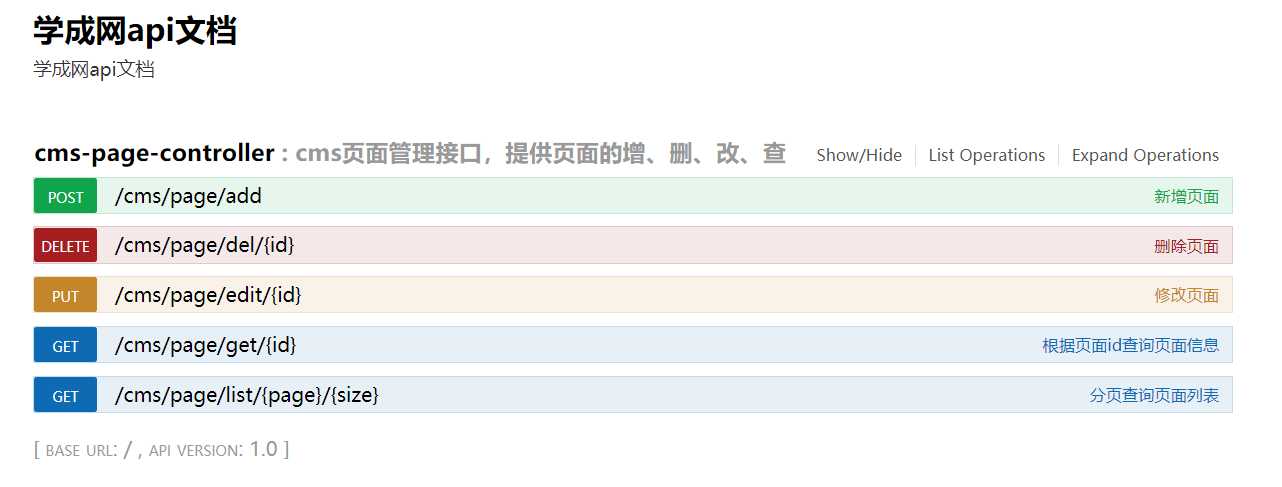
修改id

查询,拿到数据
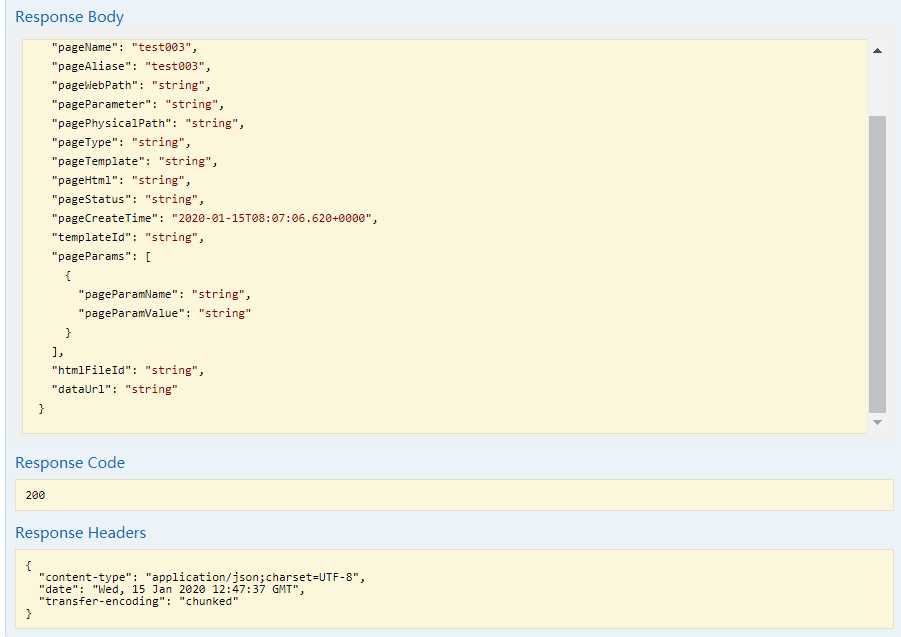
输入id

test03修改成test05
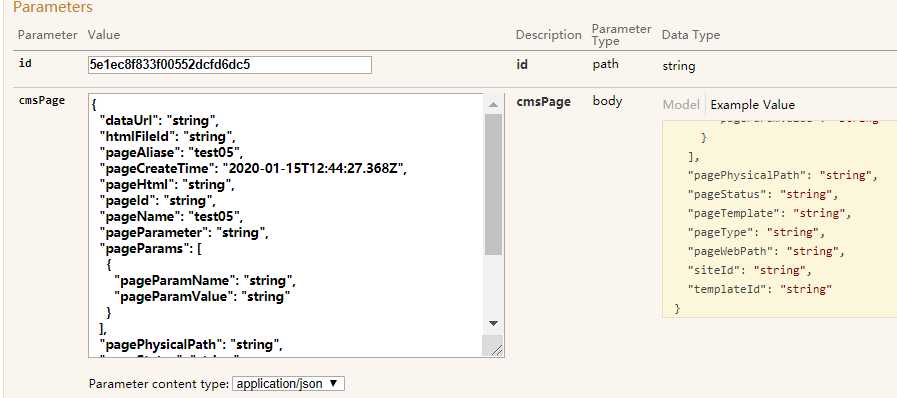
修改成功
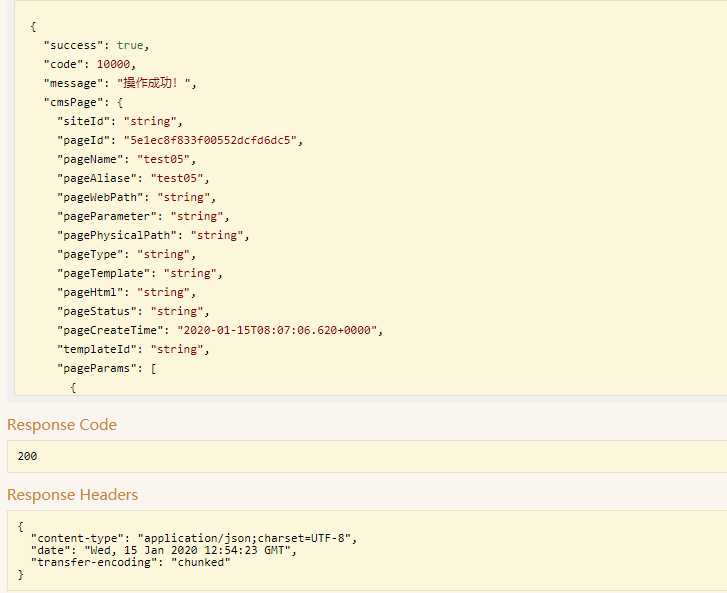
问题:
1、上边的代码只要操作不成功仅向用户返回“错误代码:11111,失败信息:操作失败”,无法区别具体的错误信
息。
2、service方法在执行过程出现异常在哪捕获?在service中需要都加try/catch,如果在controller也需要添加
try/catch,代码冗余严重且不易维护。
解决方案:
1、在Service方法中的编码顺序是先校验判断,有问题则抛出具体的异常信息,最后执行具体的业务操作,返回成
功信息。
2、在统一异常处理类中去捕获异常,无需controller捕获异常,向用户返回统一规范的响应信息。
系统对异常的处理使用统一的异常处理流程:
1、自定义异常类型。
2、自定义错误代码及错误信息。
3、对于可预知的异常由程序员在代码中主动抛出,由SpringMVC统一捕获。
可预知异常是程序员在代码中手动抛出本系统定义的特定异常类型,由于是程序员抛出的异常,通常异常信息比较
齐全,程序员在抛出时会指定错误代码及错误信息,获取异常信息也比较方便。
4、对于不可预知的异常(运行时异常)由SpringMVC统一捕获Exception类型的异常。
不可预知异常通常是由于系统出现bug、或一些不要抗拒的错误(比如网络中断、服务器宕机等),异常类型为
RuntimeException类型(运行时异常)。
5、可预知的异常及不可预知的运行时异常最终会采用统一的信息格式(错误代码+错误信息)来表示,最终也会随
请求响应给客户端。
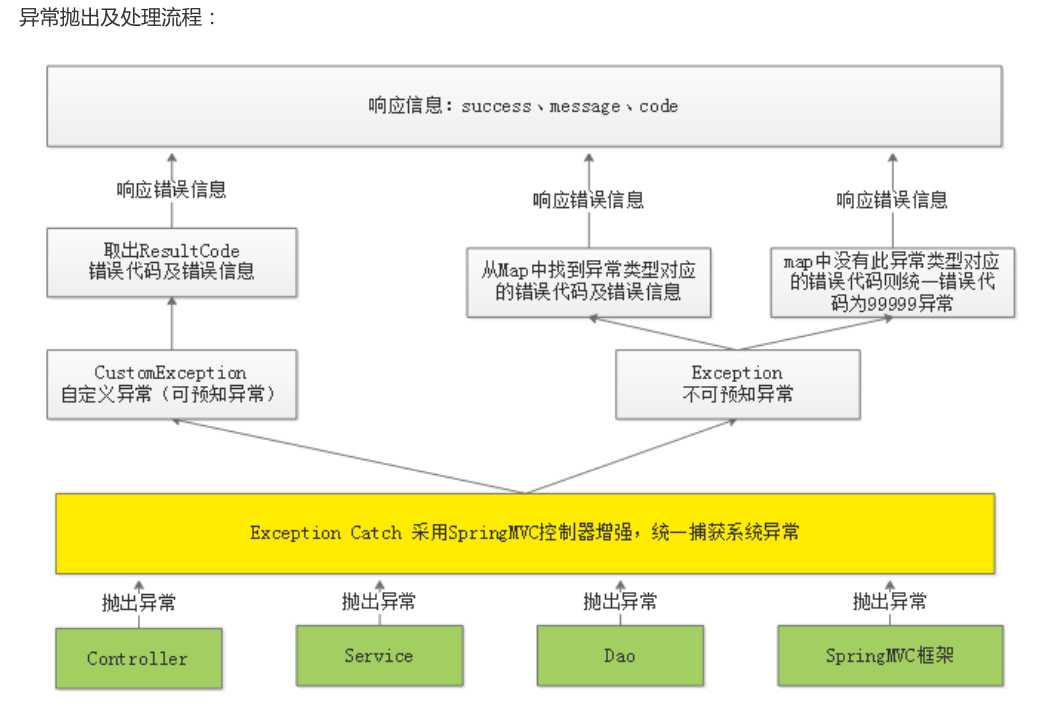
package com.xuecheng.framework.exception; import com.xuecheng.framework.model.response.ResultCode; public class CustomException extends RuntimeException { private ResultCode resultCode; public CustomException(ResultCode resultCode) { //异常信息为错误代码+异常信息 super("错误代码:"+resultCode.code()+"错误信息:"+resultCode.message()); this.resultCode = resultCode; } public ResultCode getResultCode(){ return this.resultCode; } }
package com.xuecheng.framework.exception; import com.xuecheng.framework.model.response.ResultCode; public class ExceptionCast { //使用此静态方法抛出自定义异常 public static void cast(ResultCode resultCode){ throw new CustomException(resultCode); } }

package com.xuecheng.framework.exception; import com.xuecheng.framework.model.response.ResponseResult; import com.xuecheng.framework.model.response.ResultCode; import org.slf4j.Logger; import org.slf4j.LoggerFactory; import org.springframework.web.bind.annotation.ControllerAdvice; import org.springframework.web.bind.annotation.ExceptionHandler; import org.springframework.web.bind.annotation.ResponseBody; @ControllerAdvice public class ExceptionCatch { private static final Logger LOGGER = LoggerFactory.getLogger(ExceptionCatch.class); //捕获 CustomException异常 @ExceptionHandler(CustomException.class) @ResponseBody public ResponseResult customException(CustomException e) { LOGGER.error("catch exception : {}\r\nexception: ",e.getMessage(), e); ResultCode resultCode = e.getResultCode(); ResponseResult responseResult = new ResponseResult(resultCode); return responseResult; } }
自定义异常这里要注意:
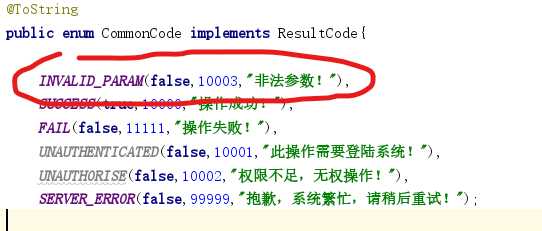
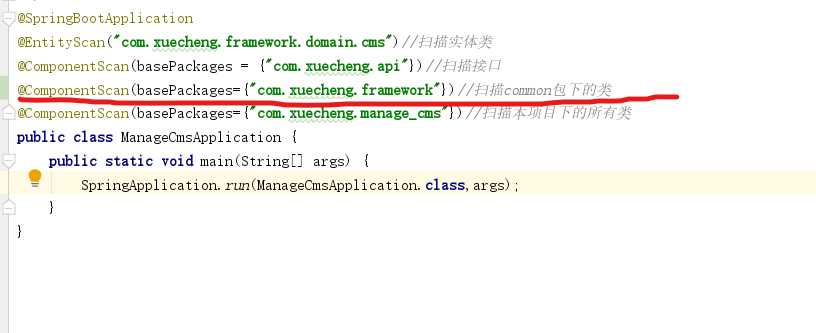

标签:custom springmvc 异常类 common 保存 time private hide 校验
原文地址:https://www.cnblogs.com/anan-java/p/12202519.html